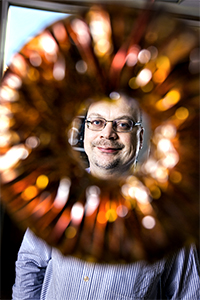Bridge builders between academia and society
Adjunct professor
As one of four adjunct professors at the School of Electrical Engineering, Lennart Harnefors makes sure that the research conducted and scientific knowledge gained effectively meet the needs of people in society.

Harnefors is one of four adjunct professors at the School of Electrical Engineering. Control of power electronic systems is the common thread in his research, which becomes evident when reading his cv. He received his M.Sc. in Electrical Engineering from KTH in 1993, and four years later, he devoted his Ph.D. thesis to the subject of control of electrical drives.
HAVING SPENT 12 years working at Mälardalen University, most recently as Professor of Electrical Engineering, Harnefors started working at ABB’s High Voltage Direct Current (hvdc) unit in Ludvika, Sweden. Then he switched to the ABB Corporate Research Center in Västerås, where he currently holds a position as Senior Principal Scientist.
“My research focuses on how electrical converters behave when they are connected to electrical circuits, and how they can be controlled and modulated in different ways,” he says. “The results can be applied to many different types of products, such as photovoltaic converters (which generate electricity using solar cells), wind turbines and robots.
“Although much of my current research deals with high-voltage converters, the principles can also have low voltage applications so, from a few kilowatts up to several hundred megawatts.”
New ABB products, such as Generation 4 of hvdc Light, have been developed as a result of Harnefors’s work. He is also involved in long-term research, for instance, on next-generation hvdc products and conceptual studies.
In 2011, Harnefors was appointed Adjunct Professor of Power Electronics at KTH. In practice, this means that he is employed by abb but spends one day a week at the School of Electrical Engineering in Stockholm.
KTH’s use of adjunct professors should be viewed in light of its ambition to maintain the highest, international standards in its research and educational programs. To achieve this goal, the institute must maintain close links with society to fully appreciate people’s need for scientific knowledge and the ways in which the results of research can be applied in practice.

As a supervisor for doctoral students, Harnefors serves as a link between academia and society, bringing them closer together. He is currently supervising two industrial Ph.D. students, one of whom is investigating system solutions for hvdc, the subject of his thesis.
On top of this, Harnefors has been teaching a Master’s course in Control in Electrical Energy Conversion, and will continue to do so in 2016.
HARNEFORS SAYS that, for SBB, one obvious benefit of having a direct link with KTH, is that the company can get in contact with master’s and doctoral students who are about to finish their studies, and thereby secure the recruitment of competent staff. ABB can also influence the education at the School of Electrical Engineering, partly through the course that Harnefors teaches at KTH and where he integrates experience from his role as Senior Principal Scientist, partly in that ABB is represented in the school’s Master’s Program Committee.
For Harnefors personally, having the adjunct professor role has meant that his research has gained more international attention, and that he has been able to produce more scientific papers.
Looking ahead, he plans to broaden his research to encompass the study of what advantages silicon carbide offers over pure silicon in semiconductors, when applied in high-voltage converters.
“BY USING SILICON carbide, you can reduce the level of conduction and switching losses,” he says. “Already today, we can see that there is a trend towards using silicon carbide in electrical vehicles, so this is definitely a hot research subject.”
Adjunct professors are assigned to work at one of KTH’s schools where they have direct contact with cutting edge scientific developments as well as educators and students. They are well-qualified individuals, who bring specialist knowledge, experience and networks to support research as well as undergraduate, graduate and third-cycle education at KTH. Most adjunct professors here have a Ph.D. and many have a docent qualification. They work part time at KTH – usually one day a week. Their adjunct professor position is a temporary one, but can be renewed following an evaluation. The total employment term may not exceed 12 years.

